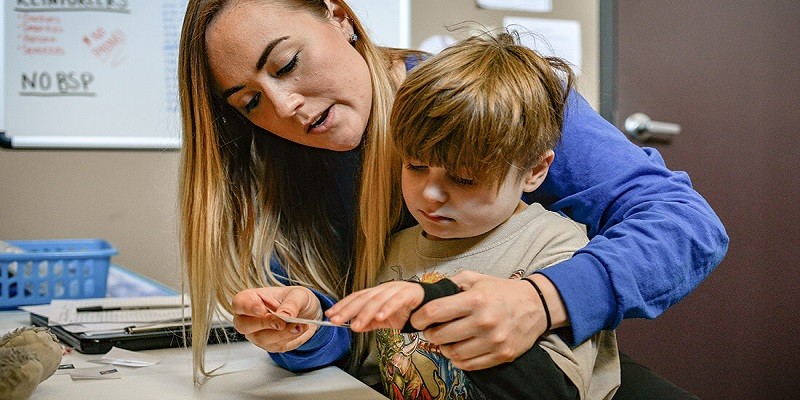No, not all autistic children will live with their parents forever. Some autistic individuals can live independently, while others may require some level of support or assisted living.
It is important to help your child develop the necessary skills for daily activities to promote independence. The future looks different for every person with autism, and it is possible for them to lead fulfilling lives with the right support and opportunities.
Autism And Independence
Possibility for some autistic individuals, while others may require ongoing support. By helping your child develop essential life skills early on, such as managing daily activities, you can promote independence. However, it’s important to recognize that each person’s journey is unique, and the level of independence will vary.
The Spectrum Of Independence For Autistic People
Autism is a spectrum disorder, which means that the level of independence can vary greatly among individuals. Some autistic people can live perfectly independently, while others may require varying degrees of support or assisted living. Understanding where your child falls on this spectrum can help guide your expectations and actions as a parent.
Factors Influencing Autistic Individuals’ Ability To Live Independently
Several factors can influence an autistic individual’s ability to live independently:
- Severity of Autism: The severity of autism can impact an individual’s ability to perform daily tasks and interact with their environment.
- Intellectual Abilities: Cognitive abilities can range widely among autistic individuals, which can affect their capability to live independently.
- Social and Communication Skills: Difficulties in social and communication skills can impact an individual’s ability to navigate the demands of independent living.
- Sensory Sensitivities: Sensory sensitivities can make certain aspects of independent living challenging for autistic individuals.
- Support System: The availability of a supportive network, including family, friends, and professionals, can greatly contribute to an autistic person’s independence.
Nurturing Independence In Autistic Children
As a parent, you can play a vital role in helping your autistic child develop the skills necessary for independence. Here are some strategies to consider:
- Start Early: Begin fostering independence from a young age. Encourage your child to participate in activities that promote self-care, such as dressing themselves, brushing their teeth, or tidying their room.
- Break Tasks into Manageable Steps: Help your child learn complex tasks by breaking them down into smaller, achievable steps. This approach can help build their confidence and competence.
- Consistency and Routine: Establish consistent routines and make use of visual schedules and timers to help your child anticipate and manage daily activities.
- Teach Problem-Solving Skills: Encourage problem-solving and decision-making by allowing your child to make choices within appropriate boundaries. Guide them through the process and help them learn from their mistakes.
- Seek Professional Support: Consult with professionals, such as occupational therapists or behavioral therapists, who specialize in working with autistic individuals. They can provide tailored strategies and interventions to support your child’s independence.
Remember, every autistic individual is unique, and the path to independence will be different for each person. Celebrate small victories and continue to support your child’s growth and development at their own pace.
Transitioning Into Adulthood: Planning For The Future
When you have an autistic child, one of the biggest questions that may constantly linger in your mind is whether they will live with you forever. As your child grows older, it’s important to start thinking about their future and making plans for their adulthood. Transitioning into adulthood brings forth a range of challenges, considerations, and decisions that need to be carefully addressed.
What Happens To Autistic Adults When Parents Die?
It’s natural to be concerned about what will happen to your autistic child when you are no longer there to care for them. While some autistic adults can live independently, others may require ongoing support or assisted living. Planning for the future involves exploring various support and care options to ensure the best possible outcomes for your child.
Exploring Support And Care Options For Autistic Adults
There are several support and care options available for autistic adults, depending on their specific needs and abilities. Some may thrive in independent living situations, while others may require varying degrees of assistance, such as supportive housing or group homes. It’s essential to research and explore the different possibilities to find the most suitable option that will ensure your child’s well-being and independence.
Legal And Financial Considerations For Long-term Care
When planning for your autistic child’s long-term care, it’s crucial to consider the legal and financial aspects involved. This may include establishing guardianship, setting up trusts or special needs accounts, and creating a comprehensive care plan that outlines medical preferences, routines, and support systems. Consulting with professionals who specialize in special needs planning can provide valuable guidance in navigating these legal and financial considerations.
Overall, transitioning into adulthood requires careful planning and consideration to ensure that autistic individuals have the necessary support and resources to thrive as independently as possible. By exploring different support and care options, addressing legal and financial matters, and continually fostering independence from an early age, you can help your autistic child pave the way towards a fulfilling and meaningful adult life.
Embracing A Lifetime Commitment: Parents’ Perspective
It is natural for parents to wonder if their autistic child will live with them forever. The future outlook varies for each individual, as some autistic people can live independently, while others may require some level of support or assisted living.
Early intervention and helping your child build essential life skills can increase their chances of independence.
Challenges And Rewards Of Caring For An Autistic Individual
Caring for an autistic child is a lifelong commitment that comes with unique challenges and rewards. Every parent wants the best for their child, and when you have an autistic child, there are additional factors to consider. While some autistic individuals can live independently, others may require ongoing care and support. It’s important to remember that each individual is different and will have their own unique needs.
When it comes to challenges, caring for an autistic child can involve managing daily activities such as shopping, cleaning, and personal hygiene. It is crucial to help your child build the necessary skills to handle these tasks as early as possible. By encouraging independence from an early age, you are setting them up for a better future.
The rewards of caring for an autistic individual are immeasurable. Witnessing their growth and progress, celebrating their achievements, and seeing them thrive despite the challenges can bring immense joy and pride to parents. It’s these small victories that make the lifelong commitment worthwhile.
Parental Advocacy And Support Networks
Being a parent of an autistic child means being their advocate. It is important to connect with support networks that understand your child’s needs and can offer guidance and assistance. These networks can include other parents of autistic children, support groups, therapists, and local organizations focused on autism awareness.
In these networks, you can find a sense of community, share experiences, and access valuable resources. Connecting with others who have gone through similar experiences can provide emotional support and a network of people who truly understand. Together, you can navigate the challenges and find comfort in the understanding that you are not alone.
Balancing Self-care With Long-term Care Responsibilities
As a parent, it’s essential to prioritize self-care while also fulfilling long-term care responsibilities. Taking care of an autistic child can be demanding, and it’s important to remember that you also need to take care of yourself.
Here are a few strategies to help you find a balance:
- Establish a support system: Reach out to family members, friends, or respite care providers who can provide assistance when needed.
- Practice self-care: Dedicate time to engage in activities that bring you joy and help you relax, such as hobbies, exercise, or meditation.
- Seek respite care: Explore options for respite care services that can give you temporary relief from caregiving responsibilities.
- Communicate with your partner: Share the responsibilities and support each other in finding time for self-care.
Remember, by taking care of yourself, you are better equipped to provide the care and support your child needs in the long run.

Credit: autismawarenesscentre.com
Frequently Asked Questions On Will My Autistic Child Live With Me Forever?
Do Autistic People Live With Their Parents Forever?
Some autistic people can live independently, while others may require support or assisted living. It is important to help them build skills for daily activities to promote independence. Autistic adults do not necessarily live with their parents forever, as many can live independently or with some support.
Will My Autistic Child Ever Live On Their Own?
While some autistic individuals may require ongoing support, many can live on their own with minimal assistance. Building independent living skills from a young age can greatly improve their ability to manage daily activities and become self-sufficient. Some autistic people can live independently.
How Long Do Children With Autism Usually Live?
Children with autism can live perfectly independent lives or may require around-the-clock care. Building independent skills early on is beneficial. Some autistic adults live independently, while others need support or assisted living. Each individual’s future and abilities vary.
Can Autistic Kids Leave A Normal Life?
Autistic individuals can lead a normal life with the appropriate support and intervention. Some may live independently, while others may require some level of assistance or care. It is important to focus on developing their skills and promoting independence from an early age.
Each person’s journey is unique, and the level of support needed may vary.
Can Autistic Adults Live Independently?
Yes, some autistic adults can live independently, while others may require some level of support or assisted living.
Conclusion
In the journey of raising an autistic child, the question of whether they will live with you forever can often arise. It’s important to remember that every individual is different, and some autistic people can live independently while others may require ongoing support or assisted living.
As a parent, you can play a crucial role in helping your child build the necessary skills for independence, such as managing daily activities. While the future may look different for each person, with proper support and guidance, your child can have the opportunity to live a fulfilling and independent life.

